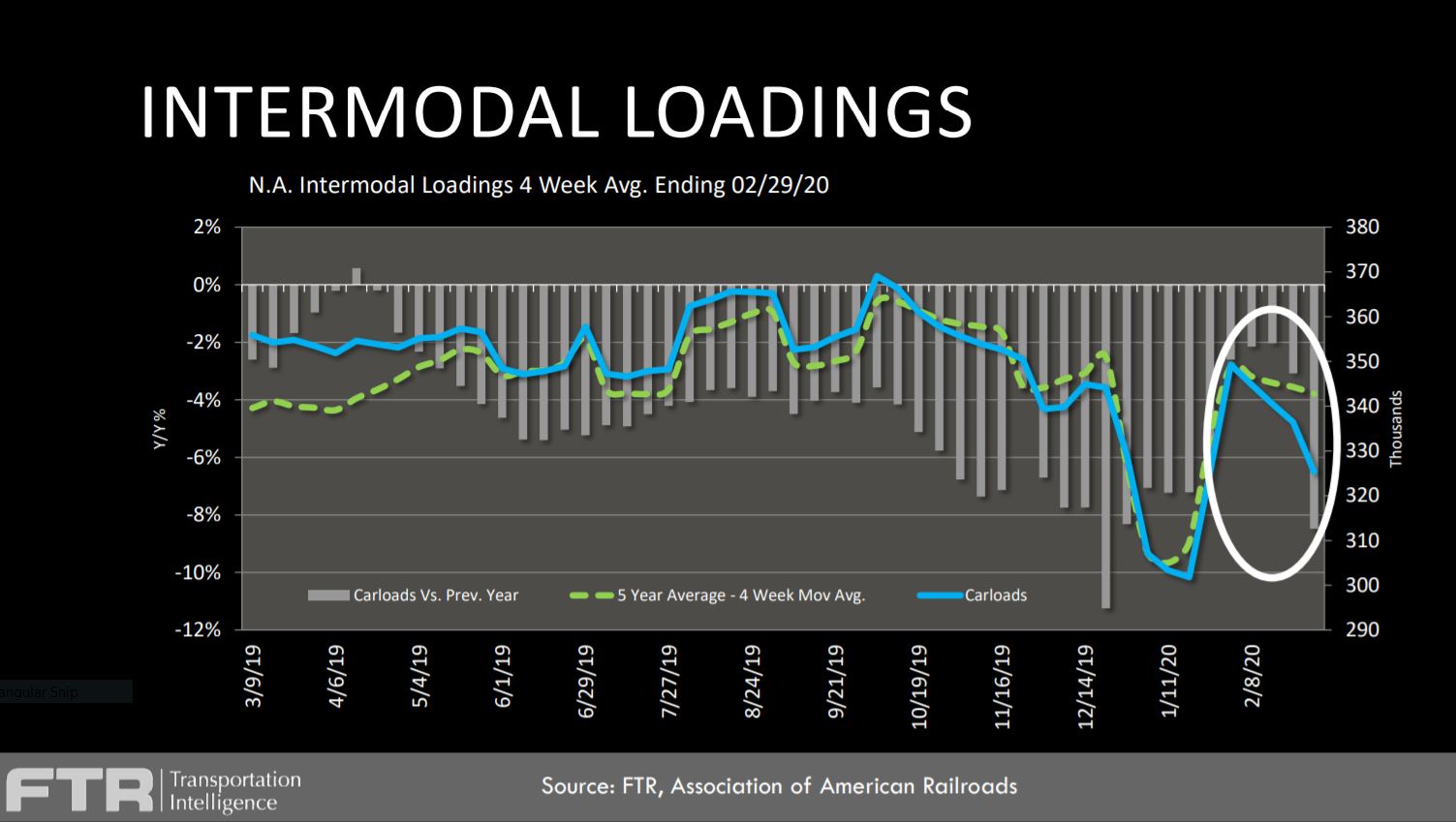ECONOMIC WATCH: Covid-19 hits intermodal hard

BLOOMINGTON, Ind. – The global coronavirus epidemic will have a profound impact on the intermodal sector in the short term as the supply chain has been noticeably disrupted, transportation intelligence provider FTR warned Thursday.
“The latest data has a huge disconnect between what has traditionally happened and what has happened in the last few weeks, and the drop-off has been substantial,” said Eric Starks, chairman and CEO of FTR.
He was speaking at a special webinar on the impact of coronavirus on the transportation industry.
The virus, formally known as Covid-19, has infected 95,000 people worldwide and killed more than 3,200 since its outbreak in China late last year. Thirty-six people have been infected in Canada while the U.S. has reported 159 cases and nine deaths.
A major reason for the supply chain disruption is that manufacturing has come to a virtual halt in China, Starks said.
“No matter what, March is going to be weak, because of the time frame that it takes for them (China) to move items across the ocean, and to get them over to the U.S. So, we anticipate that at minimum, we’re going to have pain in the system for the next two months,” he said.
Avery Vise, vice-president of trucking at FTR, said one positive outcome of the trade war with China was that the supply chain was somewhat insulated from immediate disruptions.
“Now I don’t know that you’d call this a silver lining. It is probably much too favorable of a term. And, it is not clear that you know that this at all would net out as a plus, but it is something to note,” Vise said.
He cited rapid growth in U.S. imports from a host of countries, including Vietnam, Belgium, Taiwan and the Netherlands.
“For all diversification, China is still the 800-pound gorilla in terms of U.S. imports. In (20)19 it was responsible for 18% of imported goods by value, and nearly a third of imported containerized supplies,” Vise said.
He said the supply chain problem won’t affect the trucking sector as quickly and as directly as it affects intermodal because a lot of the freight is going to be among goods that are already in inventory.
Both Stark and Vise said if the situation improves soon, that could have the potential for backfill and replenishment, leading to increased activity for freight demand through the second quarter.
“Obviously, there is a significant downside risk if we move into an environment where it is a pandemic,” Stark warned.
Amid fears over the virus, one major OEM has gone online for the biggest truck launch in its history.
Canadian compliance resources
In this country, the Canadian Trucking Alliance (CTA) has been working with the Canadian Centre for Occupational Health and Safety (CCOHS) to promote a host of compliance resources that are available to the trucking industry.
“While most of these materials focus on occupation health and safety compliance, CTA wants to make sure the membership is aware that the CCOHS also has resources available when it comes to emergency preparedness, including materials related to Covid-19/ coronavirus and pandemic awareness,” the alliance said.
Here are some of the resources available to carriers:
- Pandemic Awareness https://www.ccohs.ca/products/courses/pandemic_aware/
- Pandemic Planning https://www.ccohs.ca/products/courses/pandemic_plan/
- Coronavirus https://www.ccohs.ca//oshanswers/diseases/coronavirus.html
- Pandemic Influenza (Flu) – https://www.ccohs.ca/oshanswers/diseases/pandemic_flu.html
- Good Hygiene Practices – Reducing the Spread of Infections and Viruses https://www.ccohs.ca/oshanswers/diseases/good_hygiene.html
- Common Cold https://www.ccohs.ca/oshanswers/diseases/common_cold.html
- Hand Washing: Reducing the Risk of Common Infections https://www.ccohs.ca/oshanswers/diseases/washing_hands.html – updated Feb. 13, 2020
- Influenza https://www.ccohs.ca/oshanswers/biol_hazards/influenza.html – updated Feb. 13, 2020

Have your say
This is a moderated forum. Comments will no longer be published unless they are accompanied by a first and last name and a verifiable email address. (Today's Trucking will not publish or share the email address.) Profane language and content deemed to be libelous, racist, or threatening in nature will not be published under any circumstances.